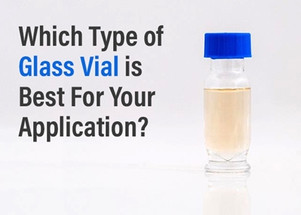Posted by Chrom Tech on 6th Nov 2025
Which Type of Glass Vial is Best for your Application?
https://chromtech.com/autosampler-vials/Glass autosampler vials are highly valued for their chemical inertness and consistency in chromatography applications. However, not all glass is created equal. Different formulations and surface treatments can influence how a vial interacts with your sample—especially at trace concentrations. Below, we explore the key types of glass vials available and how to choose the best option for your specific application.
Standard Glass Vials
The most common option for chromatography is the Type 1 borosilicate glass vial, often referred to as “neutral glass.” This material offers excellent chemical resistance, heat stability, and low reactivity, making it ideal for routine HPLC, GC, and LC-MS applications. Chrom Tech provides Type 1 borosilicate autosampler vials in every major closure style, including screw thread, snap cap, and crimp top formats.
Unless your application requires specialized treatment or ultra-clean glass, standard borosilicate vials are suitable for most analytical workflows. Their durability, clarity, and cost-effectiveness make them the preferred choice in laboratories worldwide.
Mass Spec Quality (MSQ) Vials
When working with trace-level LC-MS analyses, background interference must be minimized to maintain reliable results. Chrom Tech’s Mass Spec Quality (MSQ) autosampler vials undergo LC-MS cleanliness testing to confirm the absence of extractable residues that could interfere with sensitive mass spectrometry detection.
Our most popular MSQ vial is the Max Recovery Vial, designed specifically for Waters HPLC autosamplers. The conical bottom and precision design ensure maximum sample recovery while minimizing carryover—ideal for trace-level quantitation and regulated testing environments.
Silanized Vials
Silanized vials are recommended when working with highly polar compounds that might adsorb onto untreated glass surfaces. During silanization, the vial’s surface is treated in a vapor phase process that masks reactive silanol (Si–OH) groups by derivatizing them into nonpolar functional groups.
This surface modification prevents analyte loss due to adsorption and reduces unwanted chemical interactions. Chrom Tech offers silanized versions of most vial formats—simply look for part numbers ending in “-SIL.” These vials are particularly useful in peptide, protein, and low-level pharmaceutical analyses.
Reduced Surface Activity (RSA) Vials
For applications demanding even greater sample stability, Reduced Surface Activity (RSA) vials are an excellent choice. Unlike traditional silanization, RSA glass is engineered at the molecular level to eliminate metal ions and minimize surface activity—without requiring a coating that can degrade over time.
RSA vials provide exceptional performance for LC-MS, pharmaceutical, and low-dosage drug analyses. They maintain sample consistency for extended periods, even when autosampler sequences run overnight. For labs operating under regulated environments or performing highly sensitive work, RSA vials deliver reproducible results and unmatched cleanliness.
Explore the science behind vial selection. Visit the Chromatography Vials hub to learn more.
Frequently Asked Questions About Glass Autosampler Vials
What is the difference between borosilicate and soda-lime glass?
Borosilicate glass contains boron trioxide, giving it superior chemical resistance and thermal stability compared to soda-lime glass. This makes it the preferred choice for chromatography applications, where purity and heat tolerance are critical.
When should I use silanized vials?
Silanized vials are ideal when working with polar or reactive analytes—such as peptides, amines, or proteins—that might adsorb to untreated glass surfaces. The silane coating prevents these interactions, improving recovery and reproducibility.
How do RSA vials compare to silanized vials?
RSA vials are engineered from a proprietary glass formulation that eliminates active sites and metal contaminants. Unlike silanized vials, they don’t rely on a coating, making them more durable and consistent for ultra-sensitive LC-MS or pharmaceutical work.
Does Chrom Tech test vials for mass spectrometry use?
Yes. Chrom Tech’s Mass Spec Quality vials are verified by LC-MS testing to ensure that no extractables or contaminants interfere with analytical results, providing confidence for trace-level detection.


